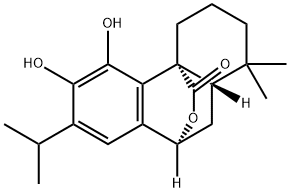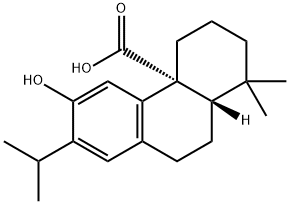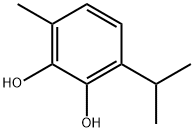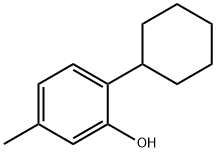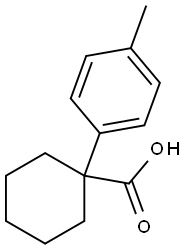PRODUCT Properties
| Melting point: | 240~242℃ |
| Boiling point: | 524.8±50.0 °C(Predicted) |
| Density | 1.26±0.1 g/cm3(Predicted) |
| storage temp. | Sealed in dry,Store in freezer, under -20°C |
| solubility | DMSO:66.0(Max Conc. mg/mL);199.74(Max Conc. mM) |
| pka | 8.91±0.40(Predicted) |
| form | Solid |
| color | White |
| biological source | Rosemarinus officinalis L. leaves |
| LogP | 2.832 (est) |
Description and Uses
Carnosol is a phenol that has been found in rosemary (R. officinalis) and has diverse biological activities. It decreases nitric oxide (NO) production in mouse peritoneal exudate macrophages when used at concentrations ranging from 6 to 25 μM. Carnosol scavenges peroxyl and hydroxyl radicals and inhibits lipid peroxidation in cell-free assays. It inhibits 5-lipoxygenase (5-LO; IC50 = 0.1 μM for the recombinant human enzyme) and the synthesis of leukotrienes in human polymorphonuclear leukocytes (PMNs; IC50 = 7 μM). In vivo, carnosol (200 mg/kg) reduces mammary DNA adduct formation and tumorigenesis in a rat model of DMBA-induced mammary tumorigenesis.
Carnosol is a phytopolyphenol found in Rosemary that functions as an antioxidant, antimicrobial, & anticarcinogen.
Safety
| Symbol(GHS) |  GHS07 |
| Signal word | Warning |
| Hazard statements | H317 |
| Precautionary statements | P280-P302+P352 |
| Safety Statements | 24/25 |
| WGK Germany | 3 |
| HS Code | 29322090 |
| Hazardous Substances Data | 5957-80-2(Hazardous Substances Data) |

